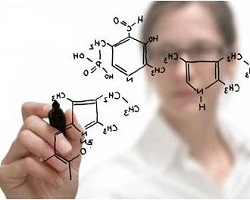Course Overview

The scientific areas, especially chemistry, play a decisive role in the scientific-technological and economic-social development process of a country. In particular, industrial chemistry is crucial to providing new forms of energy and new materials with better performance to meet the growing need for food on the planet, to promote innovation in all areas of production in short to ensure a better quality of life.
 The B.D. course in Industrial Chemistry aims to train a graduate who has an adequate knowledge of the chemical sciences, able to master general scientific methods and contents, with specific professional knowledge in the field of industrial chemistry. Graduates will have a scientific and technical training both for immediate acces to professional employments as well as to proceed in the academic studies with M.D. courses of chemistry.
The B.D. course in Industrial Chemistry aims to train a graduate who has an adequate knowledge of the chemical sciences, able to master general scientific methods and contents, with specific professional knowledge in the field of industrial chemistry. Graduates will have a scientific and technical training both for immediate acces to professional employments as well as to proceed in the academic studies with M.D. courses of chemistry.
The training activities include basic courses (math and physics) and courses in chemistry and industrial chemistry, with specific professionalisable activities in productive and research fields where knowledge of the properties of products, materials and processes is required. In particular, we provide:
- a solid basic training in mathematical and physical disciplines;
- a basic knowledge of general and inorganic chemistry, organic chemistry, physical chemistry, analytical chemistry and biological chemistry;
- the knowledge about industrial chemistry fundamentals, the product-process relationship, and a background formation about sustainable and environmental friendly chemical development;
- the knowledge about the chemical and technological nature of reactions and processes, with a particular focus on plants, safety, energy, environmental, economic and quality aspects;
- basic knowledge about polymer science, the polymers structure, synthesis mechanisms and production processes;
- basic knowledge of catalytic processes, energy production and petrochemical processes;
- the knowledge and skills for the scale-up from laboratory to the industry;
- the knowledge on the materials and products properties and their industrial and / or commercial applications;
- a deep knowledge of experimental and instrumental laboratory methods.
In order to achieve the educational objectives, the didactic arrangement provides basic training activities, mainly in the first year, with maths, physics, general chemistry, organic chemistry, physics and English chemistry, whose knowledge is a prerequisite for subsequent professional training courses chemical-industrial disciplines with attention to technological-application aspects. There is also an intensive laboratory activity, study visits to chemical industries operating in the territory and seminars held by representatives of the world of industry and the free profession.
The course lasts three years. The didactic activity is organized annually in two semesters. The title is obtained by the acquisition of 180 CFU. CFUs are acquired by passing the corresponding examinations. A CFU corresponds to 25 hours of total student study. Of these, 1 lesson CFU is equivalent to 7 hours, 1 CFU of exercises or 15 hour laboratory activity. Verification of learning is based on oral exams that can be preceded by written, practical and / or oral tests also carried out. The final exam evaluates the student's ability to expose and discuss with clarity and mastery the results of a project of chemical interest.